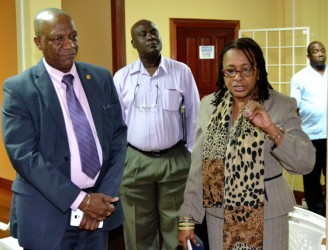The controversial One Laptop Per Family (OLPF) project is under review, according to the Ministry of the Presidency, which says a tour of the project’s office has revealed an inventory of “unserviceable and defective” computers.
According to a press release from the Ministry of the Presidency, on Wednesday, July 8th, a team headed by Minister of State Joseph Harmon visited the project’s Forshaw Street, Queenstown office as part of the ongoing process of understanding what is happening with the project—which was initiated under the Bharrat Jagdeo-led PPP/C government in 2011—and E-Governance.
The unit is administered by the Ministry.

Harmon had previously toured the offices of the E-Governance project, which is headed by Alexei Ramotar.
According to the ministry release, during the visit Harmon found a large amount of unserviceable and defective laptops, which he said is as a result of “bad sourcing of the equipment from the source country, China.”
He further said that “the sourcing was done by persons who are independent of the management of the OLPF” and “the team at the OLPF is basically managing and administering equipment that were given to them, some of which he says was basically useless.”
As a result, Harmon said the government will at this time review the operations of the project, and the linkage between what is done with the computers and what is done with the entire E-Governance project.
It reported him as saying that there is a gap between the OLPF, the E-Governance project and the delivery of the internet service to the rest of the country that needs to be properly explained.
Regarding the laptops in storage, Harmon was reported as saying that nothing can be done since there were a gift. He further said Guyana had no real say in what was received but added that he believed that if technical persons were given an opportunity to advise and choose, the decisions would not have been made to accept those gifts that are now worthless.
Harmon was accompanied by Floyd Levi, government advisor on E-Governance, and Geeta Chandan-Edmond, legal advisor in the Ministry of the Presidency.
Since its official launch in January, 2011, the OLPF project has attracted concerns about its administration and its lack of transparency. Under the programme, the government planned to distribute 90,000 laptops to poor families over three years. However, the computers distributed under the project were netbooks, not laptops, and IT experts questioned whether the instruments were adequate to fulfil the objectives of the project, which included improving computer literacy and provide educational opportunities for disadvantaged children.





